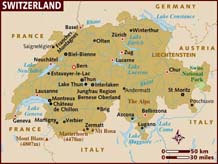Area – 41,285 square kilometers
Federal state with three politicallevels given as-:
- Federal government
- Canton
- Municipality
Switzerland – A research nation –Federal Institutes of Technology in Zurich (ETHZ) and Lausanne (EPFL) arerenowned worldwide for their research output.
Education system – Responsibilityfor education is shared between the federal authorities, the Cantons and thecommunes.
“Bologna” system in all Swissuniversities (Bachelor and Masters degree programmes).
Economy – Liberal market system.Major importer and exporter of goods and services. Well developed industry andservice provision (high-quality goods).
99% of companies are small andmedium-sized enterprises (SMEs) with a maximum of 250 employees.
4 national languages – German, French,Italian and Rumantsch.
IELTS is not mandatory forSwitzerland however the admission requirements of institutions may ask for it.
For accessingSwiss universities undergraduate programmes, a valid Swiss maturity certificateor an equivalent foreign upper secondary school-leaving certificate qualifyingfor university entrance is required. The prerequisite for access to a Master’sprogramme is a successfully completed Bachelor’s level programme. For foreigndegrees outside the Bologna system (degrees awarded in India fall under thiscategory), each of the universities makes its own decisions on equivalence ofdegrees.
- The most popularcourses are in the fields of natural sciences and engineering, as far as Indianstudents are concerned for e.g. Computer Sciences, Material and ElectricalEngineering, IT, Life Sciences, Biotechnology etc. Hotel Management courses,language courses and MBA are also high in demand.
- Living expensesare estimated between CHF 19,000 (INR 11,41,580) – and 29,000 (INR 17,42,420) –per year (depending on the location of the university and personal demands).
SwissUniversities’ curricula comply with the Bologna Declaration. Under this newtwo-tiered system, the first grade awarded is the Bachelor’s degree (threeyears full-time study) and the second one the Master’s degree (1.5 up to 2years full-time study).
The academicyear is divided into two semesters. The first semester of the academic year(“autumn semester”) spans from around the mid of September to the end ofDecember; whereas the second semester (“spring semester”) is extends fromaround mid-February to beginning of June.



